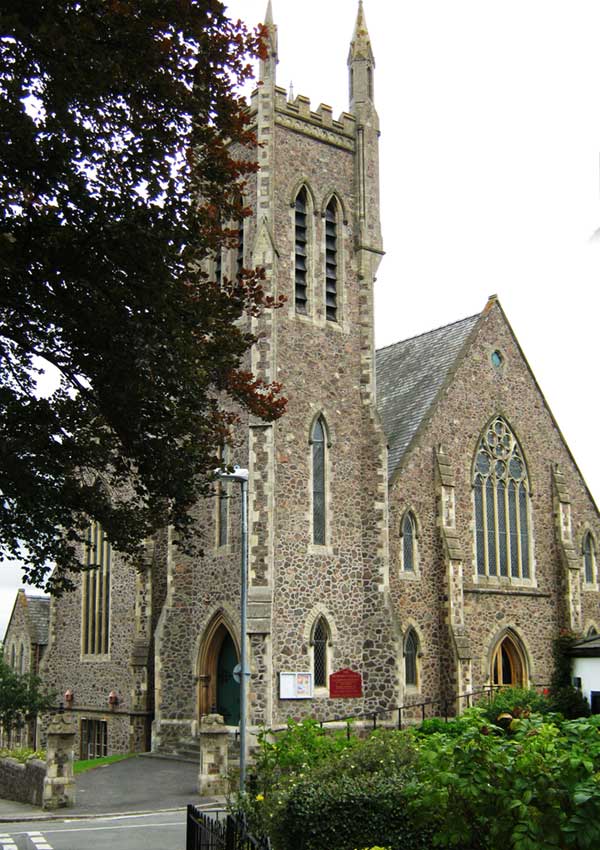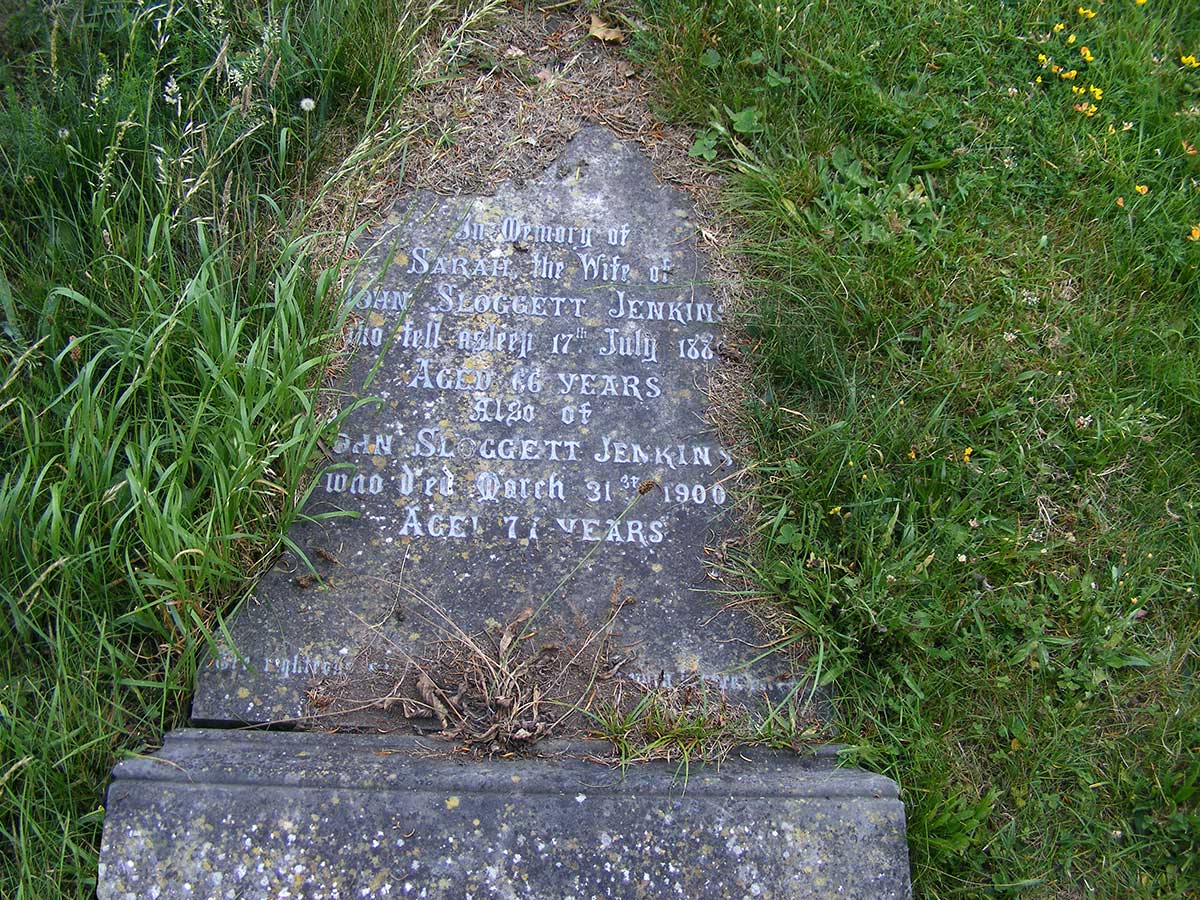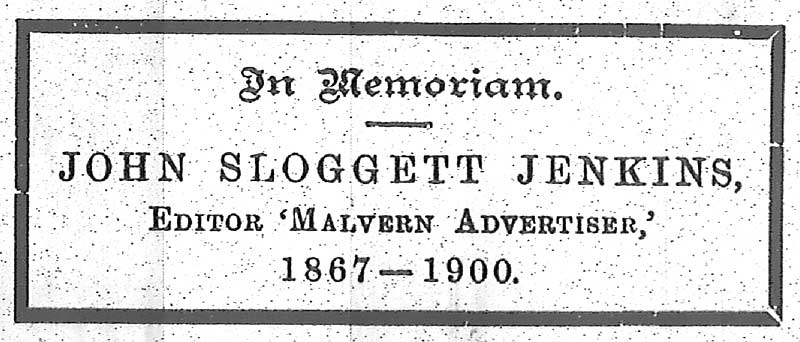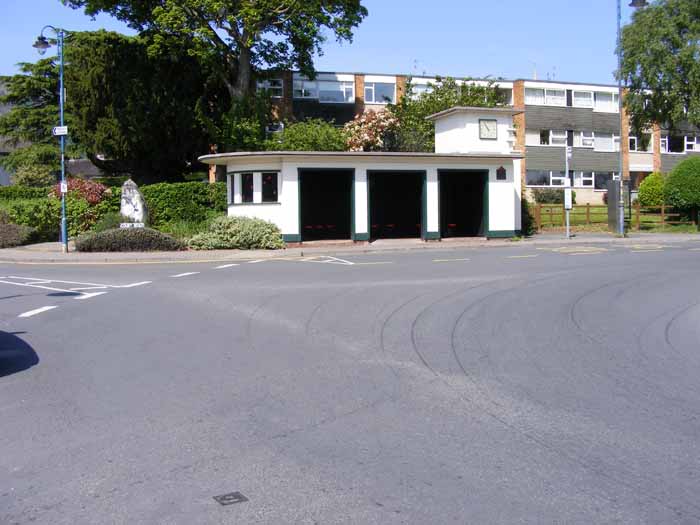
Angus and Rosemary's Miscellany
of Malvern - Local History
|
History menu > Biography of John Sloggett Jenkins (newspaper proprietor)ContentsOverviewWe came across the name John Sloggett Jenkins while researching past residents of Barnards Green, Malvern (ref 1). In 1881 John was living at Rose Cottage which once stood behind the present bus shelter with access off Avenue Road. He would have been well known in his day, as from 1867 to 1900 he was the proprietor and editor of the Malvern Advertiser newspaper. The Malvern Advertiser is one of the many valuable sources of information about Victorian and Edwardian Malvern, that can be found in Malvern library. Amongst those others we have discovered are: Kelly's Trade Directories, Norman May's Guide to Malvern, archives of the Malvern Gazette newspaper which can be viewed on microfilm, and MT Steven's Annual Directory and Gazetteer of Malvern, which was published from about 1900 to 1933. Malvern newspapersTwo of Malvern's water cure doctors are said to have promoted local newspapers; Ralph Barnes Grindrod is said to have started the 'Illustrated Malvern Advertiser, Visitors' List and General Weekly Newspaper' in 1855; it was published by H W Lamb, bookseller and stationer at the Royal Library (now the premises of Barclays Bank). Archives are held on microfilm in Malvern library for the years 1855 - 1907. James Manby Gully invested in the rival 'Malvern News' launched in 1860, published by W and J Berrows. Archives exist from 1903 - 1938. The Malvern Gazette was the last to be launched, by MT Stevens in 1898. Click to read MT Stevens' biography. A list of newspapers and periodicals appeared in Stevens' Directory of 1901. To quote, it listed:
It is interesting to note that the political leanings of the newspapers was recorded. The price, taking into account inflation , was probably not very different to that of newspapers today. 'What to see and where to go' was published by Dr Ralph Grindrod's son Charles.
Early lifeJohn Sloggett Jenkins was born at Devonport, Plymouth, on 1st October 1822, and baptised a few days later at the Wesleyan chapel in Morrice Street. He was the son of Richard and Elizabeth Jenkins nee Sloggett. His father, a boot and shoe maker, may have been the son of John Jenkins and Mary Brockedon of Totnes and if so we wondered if he was in any way related, through his mother, to the English painter and inventor William Brockedon (1787 - 1858). JS Jenkins was the eldest of nine children, the others being Harriett, Mary Ann, Susanna, Lydia, Richard, Samuel, William and Matilda. Their father died in 1842, aged only 48 years, when John was 20, and Matilda the youngest was only 2 years old. The 1841 census had listed the family living in Market Street, Stoke Damerel, Devonport, where John is recorded as a clerk and his sister Elizabeth as a dress maker. Following their father's death Elizabeth married John Risden or Risdon, then a grocer's assistant, with whom most of the family were living at Fore Street, Antony, a small village near Torpoint, Cornwall, in 1851. John's sister Harriett aged 26 was then a teacher. John however, aged 28 years was not there and we have not found him in the 1851 census; but from his obituary we know that he became a teacher of mathematics and a Methodist preacher. Later lifeMarriageOn 14th June 1854 at the Oxford Place Wesleyan Methodist Chapel, Leeds, John married Sarah Dove, the daughter of furrier and leather merchant Christopher Dove, who died later that year. They were both 31 years old. The marriage certificate describes him as a teacher, of Woodhouse Grove, son of Richard Jenkins, a boot and shoe maker. Woodhouse Grove School in Leeds was founded as a prep school for the sons of Methodist Ministers. Today it is a co-educational independent school. The witnesses to the marriage were George Reinhardt (a partner in the firm Reinhardt and Sons, Chemist and Druggist's, and a friend of the bride's father,) William Dove (bride's brother) and Benjamin Marsden (husband of bride's sister Mary). John's obituary (ref 2), see transcription below, relates that after their marriage the couple travelled to India where John took up a position as principal Mathematics Master at the Government College in Madras. A murder in the familyThe obituary then relates that the couple came home for a while because John's wife did not like the climate. The truth of that we do not know, but there could have been another reason. John's wife's brother, farmer William Dove, had married Harriett Jenkins, John's sister, at Plymouth in August 1852. It seems to have turned out a bad marriage; they did not have children, he often drank too much and the couple fought. On 1st March 1856 Harriett died of strychnine poisoning and her husband William was accused of murder. The case of poisoning by strychnine at Leeds was widely reported in the press, including lengthy reports in The Times on 8, 10, 11, 18th March; 27th June; 19th and 28th July; 2nd, 4th, 8th, 11th and 12th August 1856 (ref 3). JS Jenkins briefly returned to England to give evidence at the trial of his brother-in-law, who, from the reports, was possibly of low intelligence and a manic depressive. William Dove was found guilty of murdering his wife Harriet and subsequently hanged outside York Castle on 9th August 1856, watched by a crowd of 10,000 or so spectators. John went back to India but eventually returned to England about 1860 and spent his time between London and Totnes. The 1861 census recorded him living at Moat Hill Cottage near St Peters Quay in Totnes, with his wife Sarah, eldest child Mary Elizabeth aged 2 and widowed mother Elizabeth; he was described as a ship owner. His daughter Mary sadly died at Totnes in 1864 aged only 5 years. In 1866 John was called to give evidence to the Totnes Election Commission which was inquiring into claims that candidates bribed people to vote for them, and he was fined for burning private letters which might have been potential evidence (ref 4). He seems to have taken the moral view that private letters were private! Newspaper proprietor
We think John took over as editor of the Malvern Advertiser from water cure Dr Ralph Grindrod, who had founded the newspaper in 1855, and was a champion of the Temperance movement. We wondered if John's coming to Malvern was connected in some way with the building of Lansdowne Crescent Methodist Church in 1865/6, which Dr Ralph Grindrod helped to found despite being a member of the Anglican Priory Church. (Photo opposite: Lansdowne Crescent Methodist church) An account of Methodism in Malvern and the building of Lansdowne Methodist Church can be found in Rod Ellis's book Dissenters All, the story of the non-conformist churches of the Malverns. The 1871 census recorded John living just north of Malvern at Glenroy Villa, Leigh, when he was described as a newspaper proprietor. Also in the household in 1871 were his wife Sarah; daughter Margaret; son Henry Martyn; Louisa Baddeley, aged 19, a governess; and Jane Janes, a general servant. Connections to Methodism can be found throughout this account, and a further link can be found through the family's governess, Louisa Baddeley. Louisa Baddeley was the daughter of Rev William Baddeley, died 1885, a Wesleyan Minister, and her mother Elizabeth was the daughter of Wesleyan Minister Thomas Hall, died 1847. Louisa's brother Arthur William became a printer and stationer in Boston, Lincolnshire, while sister Agnes married William Martyn a general merchant. By 1881 JS Jenkins and his family had moved to Rose Cottage, Barnards Green, Malvern, when John, was described as a newspaper proprietor and editor, and Methodist local preacher. In 1882 he gave evidence at the Old Bailey against a man accused of fraudulently selling shares.
In 1889 John's wife Sarah died, aged 66 years, and she was buried in Great Malvern cemetery on 20th July. Their daughter Margaret who, according to the census, suffered from epilepsy, died six years later, at Powick, in 1895, aged only 33 years. A short announcement in the Malvern Advertiser on September 14th, 1895, read:
John Sloggett Jenkins, proprietor of the Malvern Advertiser for 33 years, died at Rose Cottage on 31st March 1900 in his 78th year (ref 2, 5). His funeral service was at Lansdowne Methodist Church, and he was interred in Great Malvern cemetery, alongside his wife Sarah. Their headstone lies 100 yards SW of the cemetery buildings a few yards west of the grave of MT Stevens who founded the Malvern Gazette.
Memorial to John Sloggett Jenkins John was survived by his son, solicitor Henry Martyn Jenkins, who married and later emigrated to Canada - Henry's son, John Henry Jenkins OBE, born at Malvern on 25th September 1898, became a Colonel in the Canadian army, serving in the Corps of Royal Canadian Engineers. The London Gazette reported on 1st January 1945 that, on the advice of Canadian Ministers, King George 6th had approved John Henry Jenkins's appointment, together with that of many other officers, to the Most Excellent Order of the British Empire, Commander of the Military Division (ref 7).
Transcription of obituaryThe Malvern Advertiser 7th April 1900 contained the following report.
John Sloggett Jenkins Editor 'Malvern Advertiser' 1867 – 1900 O for the touch of a banished hand, and the sound of a voice that is still. At last, in a full and honoured age, our chief, Mr John Sloggett Jenkins, has been translated from the sphere of earth to the realms immortal. Peacefully but with unanticipated suddenness, the end came on Saturday, the 31st ult, at about 9 am. No more shall we see the picturesque figure, the kindly and intelligent face, the silver locks, nor hear the pleasant tone of a voice which had an attraction in itself, even apart from the greater spell of the speech which was redolent with sympathy, considerateness, and sagacity. Mr Jenkins was the son of Richard and Elizabeth Jenkins, of Devonport, and was born on the 1st October 1822. He received his education at a local school, and had amongst his fellow-pupils the great mathematician and astronomer John Couch Adams. Deceased was himself a great lover of the science of Mathematics, in which he attained notable proficiency; many, too, there are who at this moment can testify to owing much to his lucid explanations and the inspiration of his enthusiasm, for he took up the elaboration of problems and propositions not as a task but as a recreation. At one time he was a schoolmaster at Plymouth. Subsequently he was for some years an Assistant Master at the Woodhouse Grove School, near Leeds – one of the principal Connexional schools, for the sons of Wesleyan Methodist Ministers. Upon obtaining an appointment as principal Mathematics Master at the Madras Government College, he proceeded to India with his wife in 1854. The climate however did not suit Mrs Jenkins constitution, and he brought her back to England, and then returned to his duties at Madras. After holding the post for about six years, he gave it up and returned home, and took up his abode in London and Totnes. Mr Jenkins had two daughters, and one son (Mr Henry Martyn Jenkins); the daughters, however, do not survive. Finally deceased came to live in Malvern, and in 1867 he became proprietor and editor of the Malvern Advertiser, the first issue under his hand being that of October 19th in that year. For the last eighteen months, however, he was compelled gradually to relax active service, on account of his health breaking up. With characteristic energy he threw himself into the movement which resulted in the passing of the Malvern Hills Act, and gave considerable service as Honorary Secretary to the Board formed to administer that measure. He was formerly a member of the Royds Lodge of Freemasons. While a staunch and consistent Liberal, he never failed to treat honest opponents with due courtesy, and so numbered among his real friends not a few who did not altogether side with him. He was a genuine and cheerful Christian, who preached and practised the gospel of helpfulness. Wesleyan Methodism was the denomination of his training and choice, but his sympathies were broad. He had been a total abstainer for at least half a century, and was in hearty accord with the aims of Temperance Reformers. In high class music he took great delight, especially in oratorio music. His acquaintance with the arts was extensive and his ear was almost painfully sensitive. The tones of the 'Queen of Instruments' in the hands of the virtuoso had for him an especial fascination. Also he had an exceptional acquaintance with the sciences, general literature and fine arts. Besides being a connoisseur in pictures, he was himself exceedingly apt in drawing and calligraphy. He was fond of chess, being himself a very capable player. His general tastes and habits of thought were of a refined order, and he was a delightful companion withal. Fain would we have retained him for a few more years, our revered fellow worker; but We cannot hold mortality's strong hand. A fragrant memory we shall cherish continually, and meanwhile we bow to the ordinance of the All-Wise. PERSONAL TRIBUTES A gentleman who lived and worked amongst us for a long period, whose discernment commanded wide esteem, and who besides was in touch with the departed one from early life onwards, writes: I have entertained for years past a specially cordial attachment to Mr Jenkins because of his unvaried urbanity, his literary powers, his liberality of mind, and his excellent journalistic work . . . Though a Nonconformist, he has at all times upheld the Church of England in its integrity of doctrine and practices, so as to win the approval of the Protestant community, without partiality, fear, or favour. His grasp of matters affecting the local interests of Malvern has been widely comprehensive, and has found vigorous expression in the columns of the Advertiser week after week. I can vouch for the incontestable fact that for at least a quarter of a century he has done Malvern 'yeoman service' – as the facile, clear headed, outspoken, untiring exponent of Christian principles, national loyalty, and magnanimous topical endeavours. His individuality was striking, and afforded a leonine silver-maned head, a comely good-tempered countenance, a gentle cultured voice of attractive timbre, and a stature which though somewhat diminutive commanded respect from everyone. He possessed a discriminating eye for pictures of worth, and could discern their value apart from the fictitious surroundings. Socially he was warm-hearted, genial, and affectionate – though unobtrusive, and shining chiefly in the domestic circle. But autres temps, autres moeurs! The journalism of today has outlived the simplicity and sobriety of tone which so remarkably characterised our departed Editor. He benefited his generation, and has deservedly gone to a well earned rest. Peace to his manes! Le roi est mort! Vive le roi! The Rev EE Jenkins, DD, of Southport, writes: 'My dear Sir, - I am sorry to hear of the death of my old friend Mr JS Jenkins. I knew him and Mrs Jenkins in Madras during several years. At that time, I think from 1852 – 1856, he was Mathematical Teacher in the Government College. He was deeply and widely respected. Within our missionary circle he and his wife were beloved. Mr Jenkins was a local preacher in connection with the Blacktown English Circuit, and not only in public services but in other church duties he rendered efficient help to the missionary cause. He identified himself with us in all the labours and solicitudes of a difficult mission, especially in the higher education of the natives, which was then a comparatively new work. I was very happy to renew our acquaintance a year or two ago when I visited Malvern, and to revive recollections of that genial and generous spirit which in earlier days won for our friend the esteem of the Madras public and the affection and confidence of the missionary families.' The Rev G Armstrong Bennetts writes: Sir, - I should like to be allowed to pay my little tribute to the memory of one whom I regard with filial affection and reverence, my dear old friend and my father and mother's friend – Mr John Sloggett Jenkins. He was a man of great gifts and many accomplishments, a great mathematician with remarkable skill in neat and pretty solutions of intricate problems, a good artist and art-critic, an accomplished musician with an ear of remarkable accuracy, a good classic, a first-rate linguist (in which the precision of his ear was a great assistance to him), a clever and fascinating teacher of children, and, what is of greater importance than all, a devout and earnest Christian who was anxious to consecrate his gifts to the service of the Redeemer. The extraordinary versatility of his mind has always appeared to me to have in a certain sense been his misfortune. He was so eager to know, that he was constantly launching out into new spheres of study, and thus he became too desultory to permit of that concentration which would have made him a specialist and won for him that national distinction for which his genius had fitted him. He taught me much. His influence largely moulded my mind in my boyhood, and whetted my appetite for study; so that I can never feel sufficiently grateful to one whom I shall always regard as one of my teachers who have most deeply influenced my mind and life. --- In the course of the evening service at Holly Mount Congregational Church, on Sunday last, the Rev Walter Lee (pastor) said he had been informed of the sudden death of Mr JS Jenkins. Deceased had in times past been a very kind friend of the Holly Mount Church, and usually spoke cheery words at their annual reunion. Mr Jenkins was a good man, and able man, and a devoted citizen, especially as Editor of the Malvern Advertiser. Mr Lee alluded to the connection of the deceased for a long period with the Wesleyan Methodist body and to the severe loss that would fall upon the church worshipping in the Lansdowne Crescent Chapel; and said that in the name of members of the Holly Mount Church he should send expressions of sympathy. The loss of the deceased would be felt both by the town and by the Christian church in Malvern. THE FUNERAL The sepulture took place on Wednesday, which chanced to be a bright spring day. Relatives and others assembled at the residence (Rose Cottage, Barnard's Green) soon after two o'clock, and from thence the party proceeded to the Lansdowne Crescent Wesleyan Church, where a portion of the Burial Service was conducted by the Rev J Holmes. As a preliminary voluntary MR W Higley played 'I know that my Redeemer liveth' (an aria, by the way, which was an especial favourite with the deceased), also the hymn was sung commencing, Hark! a voice divides the sky, Happy are the faithful dead! and at the end, the close was rendered the Dead March from Saul. The friends then left for the cemetery, where the remainder of the service, at the graveside, was conducted by Rev J Holmes. The body was laid in the western part of the grounds, where his wife was buried, in July 1889. Among those present either in the chapel or later were: Mr and Mrs HM Jenkins (son and daughter in law), Mr S Jenkins (of Manchester, brother), Mrs Brenton (of London, sister), Mr EJ Burrow (of Cheltenham, nephew), Mr Hancock (brother in law of Mr HM Jenkins); Mr WH Lovell (partner), and the Members of the Advertiser Staff; Rev G Armstrong Bennetts, BA, Secretary of the Wesleyan Methodist Temperance Committee; Revds FW Davenport (Vicar of Christ Church), CH Hedgman, BA, Countess of Huntingdon's Connexion, and W Lee (Congregationalist); Messrs W Lewis (The Leasowes), F Williams, C Teague, J Edwards, S Mason, and TD Jones, who acted as bearers; Messrs F Ballard, E Ballard, A Blinkhorn, W Davis (Church Street), RC Davis (for Messrs Bray and Co), H Griffith, WEP Hardwicke, W Higley, I Hamson, W Haylings, TJ Machin, GR Millbright, A Mander, J Nott, G Porter, C de Sousa, H Thorne, G Wilkins (Colwall), J Williamson, etc. Several apologies were conveyed for non-attendance. Floral tokens of respect were sent by: Mr and Mrs HM Jenkins, Mr and Mrs Brenton, Mr and Mrs Lovell and family, the Malvern Advertiser Staff, Mrs S Ballard, Mr GR Millbright, Col W Siddons Young, Miss Gwillam and Miss Beatrice Gwillam, Mr and Mrs CC Broad, Mr and Mrs W Haylings. The inscription on the coffin was: John Sloggett Jenkins. Died March 31st 1900. Aged 77 years. Messrs Gwynn were the undertakers. Mr and Mrs H Martyn Jenkins desire to express their sincere thanks for many kind inquiries and expressions of sympathy. A short announcement in the Births Marriages and Deaths column of the newspaper read, DEATH Jenkins – On the 31st March, at his residence, Rose Cottage, Barnards Green, with unexpected suddenness, John Sloggett Jenkins, in his 78th year.
The site of Rose Cottage, now Chestnut Court flats FamilyAmong those present at the funeral were: JS Jenkins's youngest brother, Samuel Jenkins, who was a teacher of mathematics and was working in Manchester at the time. JS Jenkins's youngest sister Matilda, who had married accountant Thomas Brenton. In the 1911 census, when the couple are living at Pagoda Avenue, Richmond, Surrey, Thomas described himself as secretary of a gold and silver refining company. A nephew, Edward John Burrow (1869 - 1935), the youngest son of JS Jenkins's sister Lydia who had married watchmaker James Burrow. Edward's parents had died when he was 12 years old, and we wondered whether John Sloggett Jenkins either took him in, or became his guardian. The 1891 census described Edward as an artist, etching, who was boarding at Oxford Villa in Cheltenham. The 1901 census describes him as an artist and publisher, while the 1911 census describes him as a publisher of guide books. He became a man of note and his obituary was published in the Times on September 20th 1935. Also present was George Henry Hancock, the brother of JS Jenkins's daughter-in-law, who records himself as a Potter's Chemist in the 1911 census; we wondered if he worked at the Royal Worcester factory. His father had been a china painter. We think JS Jenkins may also have had a younger brother William Brockedon Jenkins (1835 - 1915) who became a watchmaker and jeweller in Bristol. He married Augusta Ann Honey, the daughter of Captain John Honey a master mariner who died 6th December 1861 on the Barque 'George' of Bristol, off Bonny Bar, Nigeria, on the west coast of Africa. The couple had at least six children before Augusta died at the relatively young age of 42 years, in 1879. Wife's familyThe family of JS Jenkins's wife, Sarah Dove, also seems to have been keen supporters of the Wesleyan Methodist movement. Sarah's father Christopher Dove, died 1854, had married firstly Miss Steele the sister of Rev Anthony Steele who in 1837 published the 'History of Methodism in Barnard Castle and the principal places in the Dales Circuit'. Christopher married second, Mary Dunn, said to have been the author of 'Thoughts on Dress'. He lived at Prebend Row in Darlington, moving in 1820 to Wellington Place, a house built by George Spencer; later moved to Grange House, and after moved business to Leeds; described as a gentle good man, died 24th December 1854 aged 71 years, buried at Oxford Place Wesleyan Chapel, Leeds - the erection of the chapel had been decided at a meeting in his drawing room. Christopher Dove's obituary was published on 30th December 1854 in the Leeds Mercury. Sarah's sisters seem to have made good marriages. Mary Dove (1818 - 1864) married Benjamin Marsden at Leeds in 1840, who at the time of their marriage was a hosier and glover. Despite their lives being short they had 8 children. Elizabeth Dove (1821 - 1847) married Wesleyan Minister John Holt Lord (1819 - 1902). Elizabeth had one son, printer, Christopher Dove Lord (1846 - 1866) who died in New Zealand on 25th December 1866 and is buried in the Mission Ground Cemetery, Whangarei, near Auckland. Rev John Holt Lord, who had been the principal of Woodhouse Grove School in Leeds, married second Jane Wills by whom he had 4 children.
John Rickatson Burton was a Civil Servant who had enlisted at Perth on 21st August 1915. He embarked on HMT Corsican in 1916 to join the BEF, arriving at Marseilles on the 5th April. On the 29th July he was reported missing, and a court of inquiry was held which concluded he had been killed in action on 25th July 1916 (ref 8). His name is recorded on the Villers-Bretonneux Australian National Memorial in Picardie, France Final noteAnd so it would seem John Sloggett Jenkins grew up in Devonport, and was able to acquire a good education, possibly helped by the Wesleyan Methodist movement at a time when schooling was not compulsory. Throughout his life he was an active member of the Methodist church, a local preacher, and a man of goodwill. References
If you can add to this story do please get in touch.
|
|
Last updated 29th October 2018 |

 According to JS Jenkins's obituary, he became proprietor and editor of the
Malvern Advertiser about 1867. One source has described the newspaper as 'a
local mouthpiece of independent politics'.
According to JS Jenkins's obituary, he became proprietor and editor of the
Malvern Advertiser about 1867. One source has described the newspaper as 'a
local mouthpiece of independent politics'.
 In Memoriam
In Memoriam
 Jane Dove (1832 - 1917), the longest living sibling, married
Wesleyan Minister Henry Rickatson Burton (1831 - 1903) by whom she had 8
children.Their son Robert Rickatson Burton emigrated from England to
Australia during the gold rush and died at Perth, Western Australia, in
1944. Sadly their eldest son, Sarah's great nephew, John Rickatson Burton,
Private 4040, 11 Bn Australian Infantry, died in France on 25th July 1916
aged only 18 years.
Jane Dove (1832 - 1917), the longest living sibling, married
Wesleyan Minister Henry Rickatson Burton (1831 - 1903) by whom she had 8
children.Their son Robert Rickatson Burton emigrated from England to
Australia during the gold rush and died at Perth, Western Australia, in
1944. Sadly their eldest son, Sarah's great nephew, John Rickatson Burton,
Private 4040, 11 Bn Australian Infantry, died in France on 25th July 1916
aged only 18 years.